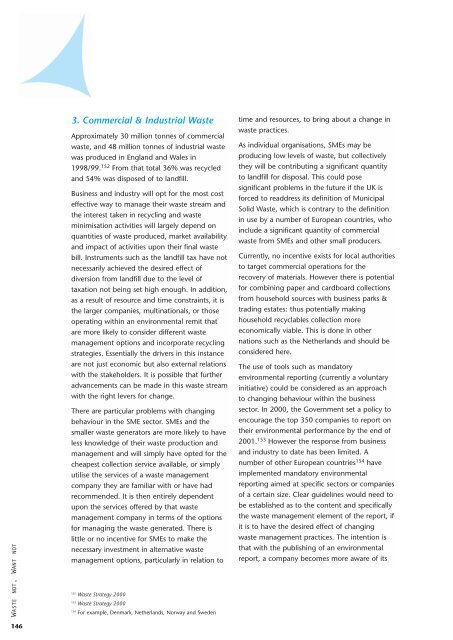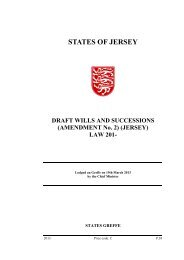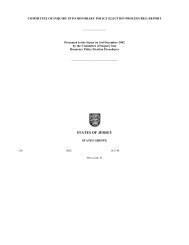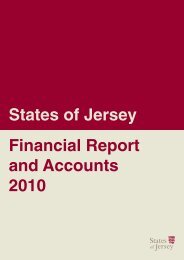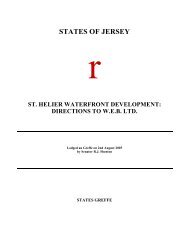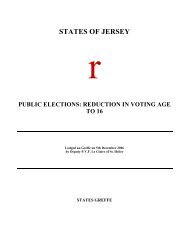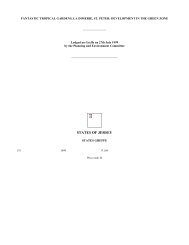Waste not want not - States Assembly
Waste not want not - States Assembly
Waste not want not - States Assembly
You also want an ePaper? Increase the reach of your titles
YUMPU automatically turns print PDFs into web optimized ePapers that Google loves.
WASTE NOT, WANT NOT<br />
146<br />
3. Commercial & Industrial <strong>Waste</strong><br />
Approximately 30 million tonnes of commercial<br />
waste, and 48 million tonnes of industrial waste<br />
was produced in England and Wales in<br />
1998/99. 152 From that total 36% was recycled<br />
and 54% was disposed of to landfill.<br />
Business and industry will opt for the most cost<br />
effective way to manage their waste stream and<br />
the interest taken in recycling and waste<br />
minimisation activities will largely depend on<br />
quantities of waste produced, market availability<br />
and impact of activities upon their final waste<br />
bill. Instruments such as the landfill tax have <strong>not</strong><br />
necessarily achieved the desired effect of<br />
diversion from landfill due to the level of<br />
taxation <strong>not</strong> being set high enough. In addition,<br />
as a result of resource and time constraints, it is<br />
the larger companies, multinationals, or those<br />
operating within an environmental remit that<br />
are more likely to consider different waste<br />
management options and incorporate recycling<br />
strategies. Essentially the drivers in this instance<br />
are <strong>not</strong> just economic but also external relations<br />
with the stakeholders. It is possible that further<br />
advancements can be made in this waste stream<br />
with the right levers for change.<br />
There are particular problems with changing<br />
behaviour in the SME sector. SMEs and the<br />
smaller waste generators are more likely to have<br />
less knowledge of their waste production and<br />
management and will simply have opted for the<br />
cheapest collection service available, or simply<br />
utilise the services of a waste management<br />
company they are familiar with or have had<br />
recommended. It is then entirely dependent<br />
upon the services offered by that waste<br />
management company in terms of the options<br />
for managing the waste generated. There is<br />
little or no incentive for SMEs to make the<br />
necessary investment in alternative waste<br />
management options, particularly in relation to<br />
152<br />
<strong>Waste</strong> Strategy 2000<br />
153<br />
<strong>Waste</strong> Strategy 2000<br />
154<br />
For example, Denmark, Netherlands, Norway and Sweden<br />
time and resources, to bring about a change in<br />
waste practices.<br />
As individual organisations, SMEs may be<br />
producing low levels of waste, but collectively<br />
they will be contributing a significant quantity<br />
to landfill for disposal. This could pose<br />
significant problems in the future if the UK is<br />
forced to readdress its definition of Municipal<br />
Solid <strong>Waste</strong>, which is contrary to the definition<br />
in use by a number of European countries, who<br />
include a significant quantity of commercial<br />
waste from SMEs and other small producers.<br />
Currently, no incentive exists for local authorities<br />
to target commercial operations for the<br />
recovery of materials. However there is potential<br />
for combining paper and cardboard collections<br />
from household sources with business parks &<br />
trading estates: thus potentially making<br />
household recyclables collection more<br />
economically viable. This is done in other<br />
nations such as the Netherlands and should be<br />
considered here.<br />
The use of tools such as mandatory<br />
environmental reporting (currently a voluntary<br />
initiative) could be considered as an approach<br />
to changing behaviour within the business<br />
sector. In 2000, the Government set a policy to<br />
encourage the top 350 companies to report on<br />
their environmental performance by the end of<br />
2001. 153 However the response from business<br />
and industry to date has been limited. A<br />
number of other European countries 154 have<br />
implemented mandatory environmental<br />
reporting aimed at specific sectors or companies<br />
of a certain size. Clear guidelines would need to<br />
be established as to the content and specifically<br />
the waste management element of the report, if<br />
it is to have the desired effect of changing<br />
waste management practices. The intention is<br />
that with the publishing of an environmental<br />
report, a company becomes more aware of its


